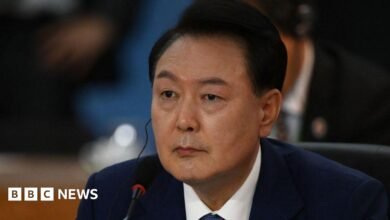How Luigi Mangione’s legal defence could take shape

He said Mr Mangione would plead not guilty to the charges he faces in Pennsylvania, including firearms charges.
In New York, he has been charged with second-degree murder over Mr Thompson’s killing. The 50-year-old chief executive of UnitedHealthcare, was shot dead by a masked assailant outside a Manhattan hotel on 4 December in what authorities say was a targeted attack.
Mr Mangione is currently being held in a state prison in Pennsylvania where he is fighting extradition to New York to face that murder charge. The legal battle over his extradition could potentially take more than a month to resolve, officials said.
But legal experts told the BBC that his efforts to contest his extradition to New York are unlikely to be successful. They could, however, provide his defence with a glimpse into the state’s evidence against him.
“I don’t even know if this is him,” his lawyer, Mr Dickey, said in a recent interview with US media outlet NewsNation, referring to images of Mr Thompson’s killer.
“We’re going to test those waters and give the government a chance to bring some evidence forward,” he said.
If he is extradited to New York to face the murder charge, Mr Mangione and his legal team face an uphill battle as they try to mount a defence, the experts said.
Mitchell Epner, a New York-based lawyer and former prosecutor, told the BBC that there are, broadly, two approaches that Mr Mangione could take if he pleads not guilty to Mr Thompson’s murder.
“Defence number one is ‘it wasn’t me’ and defence number two is ‘it was me, but I shouldn’t be punished’ because of X,” he said.
According to New York police, Mr Mangione was found with a gun similar to the murder weapon, a silencer and a fake ID, as well as three handwritten pages which they believe suggest a potential motive.
Mr Epner said that the publicly known evidence so far means denying responsibility is “out the window”.
Another New York-based lawyer, criminal defence attorney and Professor Dmitriy Shakhnevich, said Mr Mangione’s attorney could also, in theory, argue that an impaired “mental status” makes him unfit to stand trial.
“If a judge makes a determination that he’s misunderstanding, or not understanding, what’s happening in court, then essentially the case won’t go forward,” he said.
“He’ll be institutionalised for a period of time until he’s deemed to be fit, which may be never.”
That defence, Mr Shakhnevich added, is different to a plea of insanity, in which his lawyers could argue that “he’s not responsible for his actions because of some mental defect”.
“That could also deem him not guilty, because you won’t satisfy the elements of the offence,” he said. “But then again, he doesn’t go free. He would be institutionalised for a period, assuming that defence is successful.”
Source link



